From the command centre in Kyiv, Olena Zelenska’s urgent plea to help her nation as war rages around her
Bel Trew sits down with the first lady in a wide-ranging interview discussing her work rebuilding Ukraine in the middle of war – and the pressures on her family

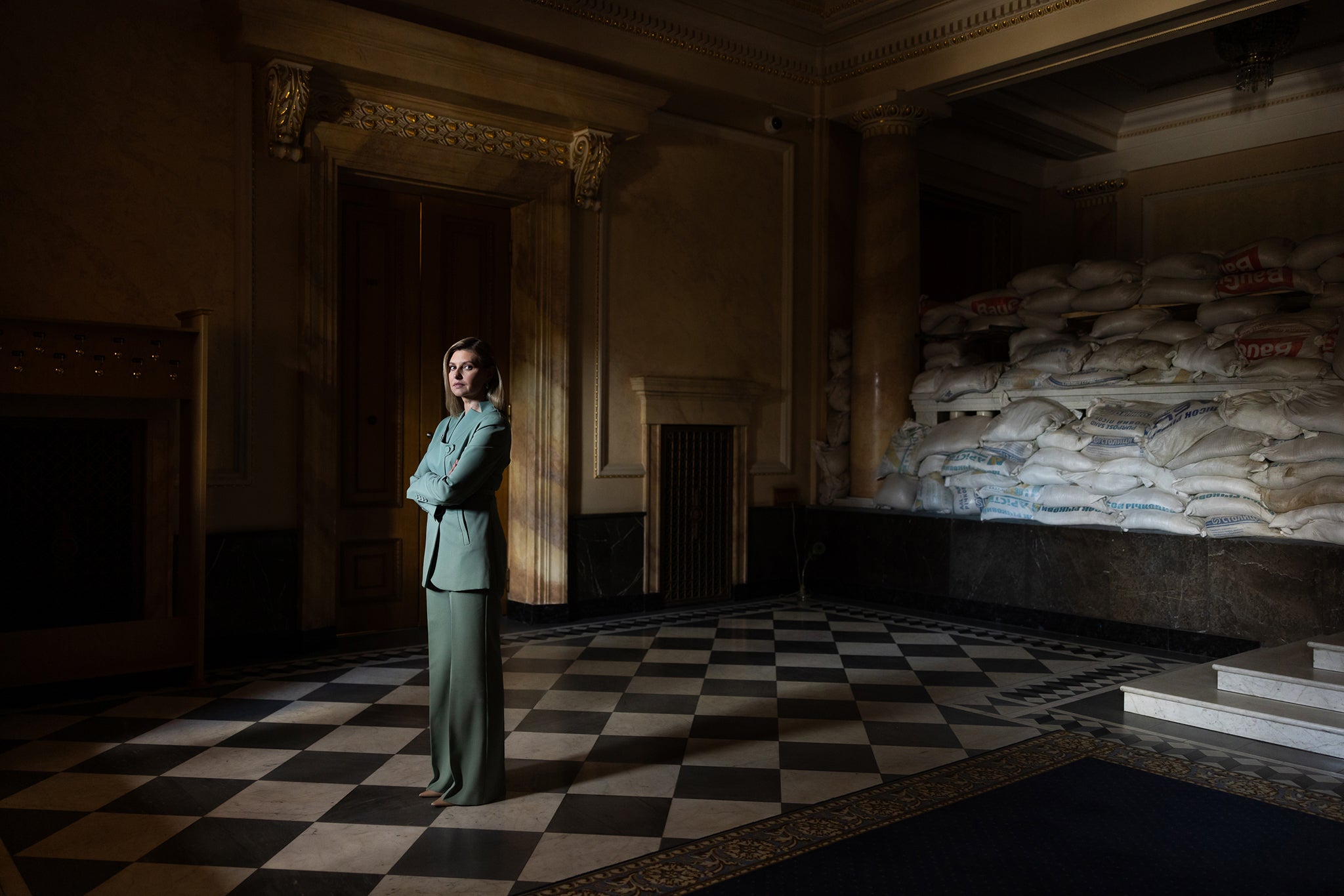
Your support helps us to tell the story
From reproductive rights to climate change to Big Tech, The Independent is on the ground when the story is developing. Whether it's investigating the financials of Elon Musk's pro-Trump PAC or producing our latest documentary, 'The A Word', which shines a light on the American women fighting for reproductive rights, we know how important it is to parse out the facts from the messaging.
At such a critical moment in US history, we need reporters on the ground. Your donation allows us to keep sending journalists to speak to both sides of the story.
The Independent is trusted by Americans across the entire political spectrum. And unlike many other quality news outlets, we choose not to lock Americans out of our reporting and analysis with paywalls. We believe quality journalism should be available to everyone, paid for by those who can afford it.
Your support makes all the difference.As if on cue, the haunting wail of the air-raid siren sifts through the sunshine as we pull up to the checkpoint by the presidential complex in Kyiv. Like swathes of Ukraine, the contours of this heavily guarded compound have been re-carved by President Vladimir Putin’s invasion. Instead of a sweeping pedestrian boulevard leading to 10 Bankova – Ukraine’s 10 Downing Street – the complex is a disorientating labyrinth of blast walls, sandbags, and soldiers.
Inside this bunker, it is as quiet and dark as a sunken cathedral. The windows are boarded up and filters cover each light casting an eerie muted glow. Sandbags, like used tissues, are wedged between marble columns. A chandelier which is not switched on, crowns the sweeping stairwell which leads up to makeshift barricades punctured by embrasures. It feels like the presidential compound and its inhabitants are poised and prepared. Including the First Lady - Olena Zelenska - whom we are here to meet.
“I would like to say, ‘I’m fine’ but no one can say this phrase now in Ukraine,” she replies, “How are you?” the simplest of introductory questions that lands a bit limply under the current circumstances.
Watch the interview below
The full interview is available to watch on The Independent’s website and on your smart TV.
“We are all tense. We are all waiting for victory. We are trying, and I am also trying, to keep our hand on the pulse. To wait for good news and to not lose hope,” she adds, with the briefest flick of a weary smile.
Weariness is perhaps an apt word. It underpins her main message of this interview: concern that as Putin’s war grinds into its 18th bloody month, the international community might begin to lose interest or perspective on the battles chewing up Ukraine, with deadly consequences for everyone.
“If the aggressor wins now, it will be the worst-case scenario for all of humanity,” she says with a quiet assurance.
“This will mean that global deterrents aren’t working. This will mean that anyone with power, strength and sufficient financial capacity can do whatever they want in this world.”
“We keep hearing from our Western partners that they will be with us as long as it takes. I would like to say that the word ‘long’ is not the word we should use. We should use the word ‘faster’.”
Olena Zelenska, 45, I would argue, has one of the trickiest jobs in the world.
War aside, like so many women thrust into a public spotlight that she never sought, she faces unrelenting scrutiny. The former comedy scriptwriter turned First Lady-at-war cannot smile too much, lest she be seen as not taking the devastation of the invasion seriously. But she can’t smile too little, or she is labelled ungrateful. There are endless discussions about her clothes (she was named among the best dressed at the coronation of King Charles III which she attended).
Ukrainian diplomats tell me quietly on the sidelines, she is almost always asked about being a mother-of-two, a wife, a crutch-like appendage to her husband Volodymyr Zelensky, 45, over the crucial work she is doing on the ground. She is inevitably tossed the emotional questions, that interviewers may shy from asking the men.
And so today, as we sit in the heart of the country’s operations hub, in the wake of an air raid, our hour-long conversation centres on her work. This ranges from building a network of hospitals and prosthetic centres treating an estimated 20,000 new amputees in the country - to launching mental health programmes to smash stigmas on trauma.
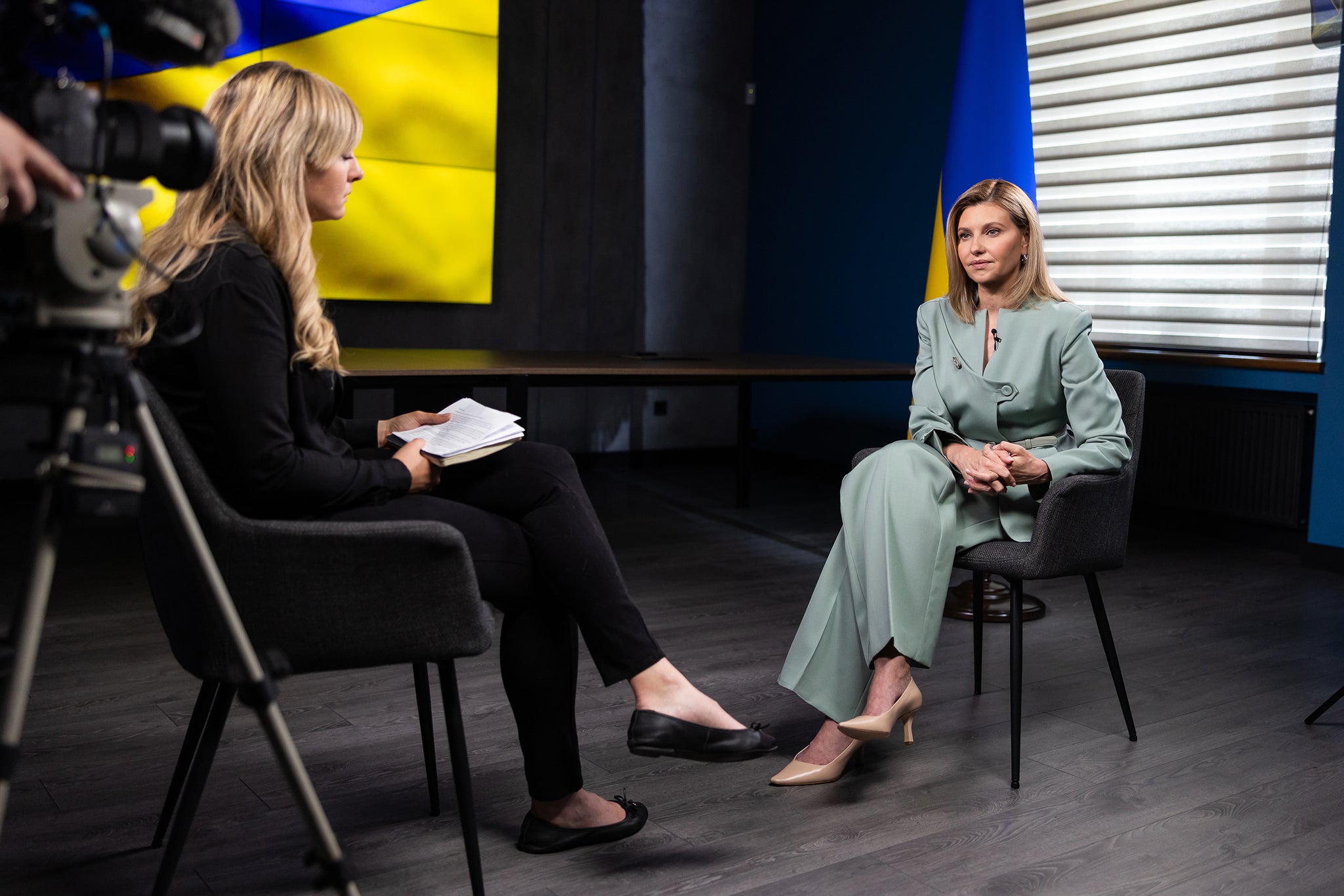
We also talk about her latest passion: changing the role of first ladies and gentlemen around the world from individual “decorative” accessories to something more. She wants to “set a trend” where presidential partners “communicate, exchange experiences, create joint projects”.
She speaks warmly about specific families that keep her motivated in her work – including a Ukrainian grandmother who “knocked on every door” to find her granddaughter who, like thousands of other children, had been disappeared into Russia by soldiers. Finding the tens of thousands of children that Ukraine accuses Russia of abducting is a personal mission for the first lady, which she calls “one of the biggest wounds in Ukraine”.
“We are trying to get our children back. It is hard to find an area of children’s life that the war has not touched.”
That includes the lives of her own children, who are forced to live separately from their father for security reasons – a topic she tentatively opens up about.
“Maybe [now] it is more frequent that we can see each other altogether but these are still isolated instances,” she says, with a quiet sadness. “I am sure that we will pass this test.”
All of this is a far cry from the woman who four years ago said she struggled with public speaking after advising her husband, then a colleague in their comedy troupe, against running for president. In fact, she didn’t even know he was going to go through with it: like the rest of the country, Mrs Zelenska found out about his presidential bid after a New Year’s Day television special in 2019. Mr Zelensky apparently “forgot” to mention the life-altering decision to his wife.
But ever since President Putin ordered his troops to march on Kyiv – in an instant making her husband the war-time protector of Ukraine – she has put her fears aside. He donned military khaki and, standing outside the very building we are in, vowed never to flee Ukraine. She morphed into frontline ambassador, rallying lifesaving international support for a country in the grips of Europe’s bloodiest war in generations.
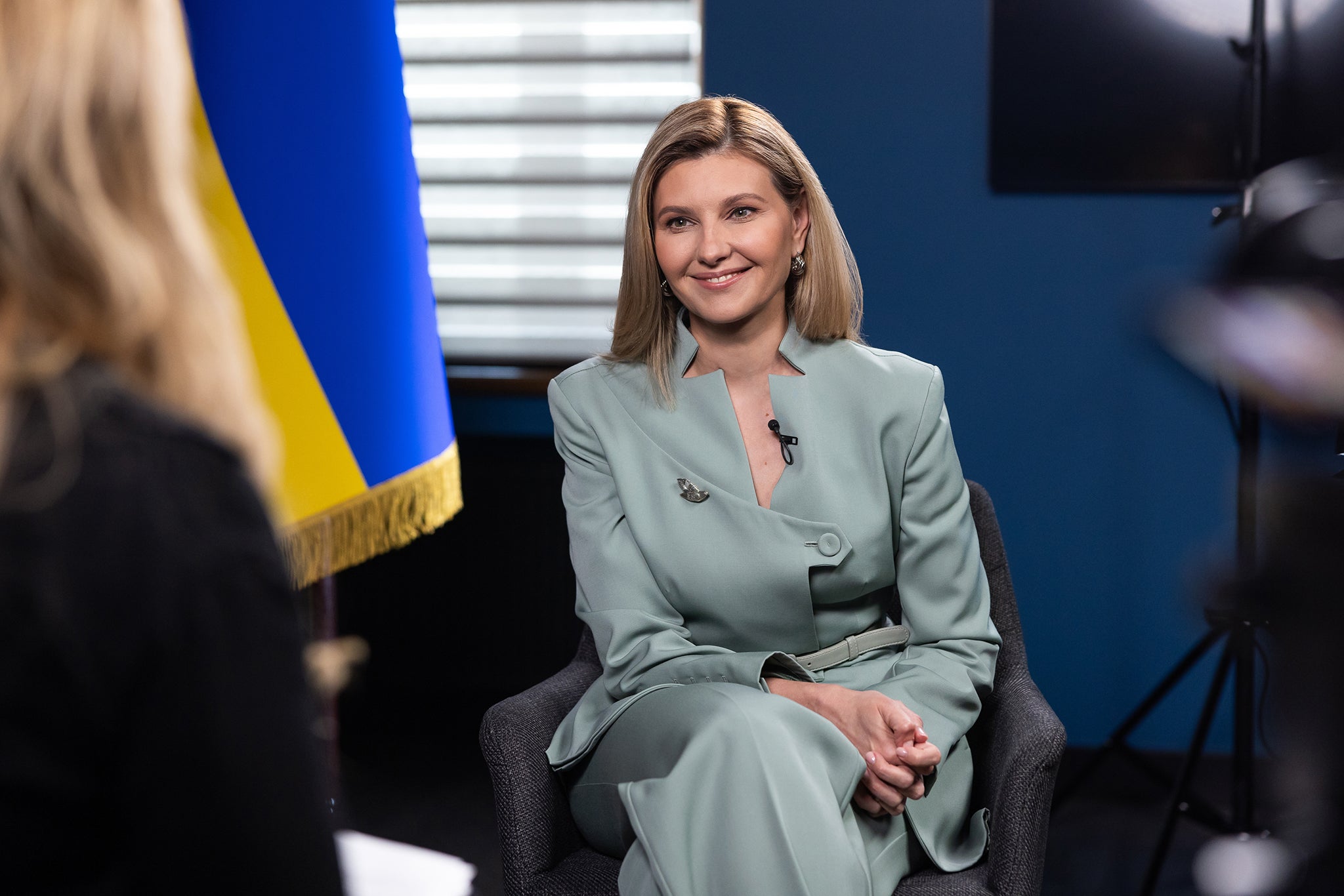
She became one of the architects of the rebuilding of this nation, ravaged by a 2,000km frontline, even while the fighting goes on. If Ukraine doesn’t rebuild during the war it is “wasting time” even if there is a threat it gets destroyed again, she insists. “Wherever there are people, there should be reconstruction as soon as possible”.
The truth is Mrs Zelenska could have left Ukraine permanently, like the wives of other Ukrainian politicians (under martial law only women can evacuate the country). Effectively a single parent now, she would have been forgiven for taking a step back to focus on her children.
But she did not.
Last July she addressed Congress, in November she spoke to the British parliament and in January she was at Davos in Switzerland. In all her speeches she pulls no punches. “We know that the youngest girl who was raped by the Russian occupiers is four years old. The oldest is 85 years old,” she told Westminster bluntly while urging the UK to help establish a Special Tribunal so Russia can face justice for its crimes.
Back in Ukraine, she rallies the Ukrainian public through her social media accounts, urging families to “stay strong”. Like this week when Russian shelling eviscerated an apartment block in the southern city of Kryvyi Rih, which is also her and her husband’s hometown.
And now here, in the presidential palace where her husband also works, she is eloquent and concise when talking.
“All the fears, all the phobias, all the unpleasant moments that we experienced in peacetime fade into the background,” she says, explaining her transition to a public figure in war. “The fact that I said that I don't really like public speaking - does not matter now. I have to be effective in my role to support the president and the people of Ukraine.”
And with a pause and shy smile, she adds “I hope they feel that I am”.
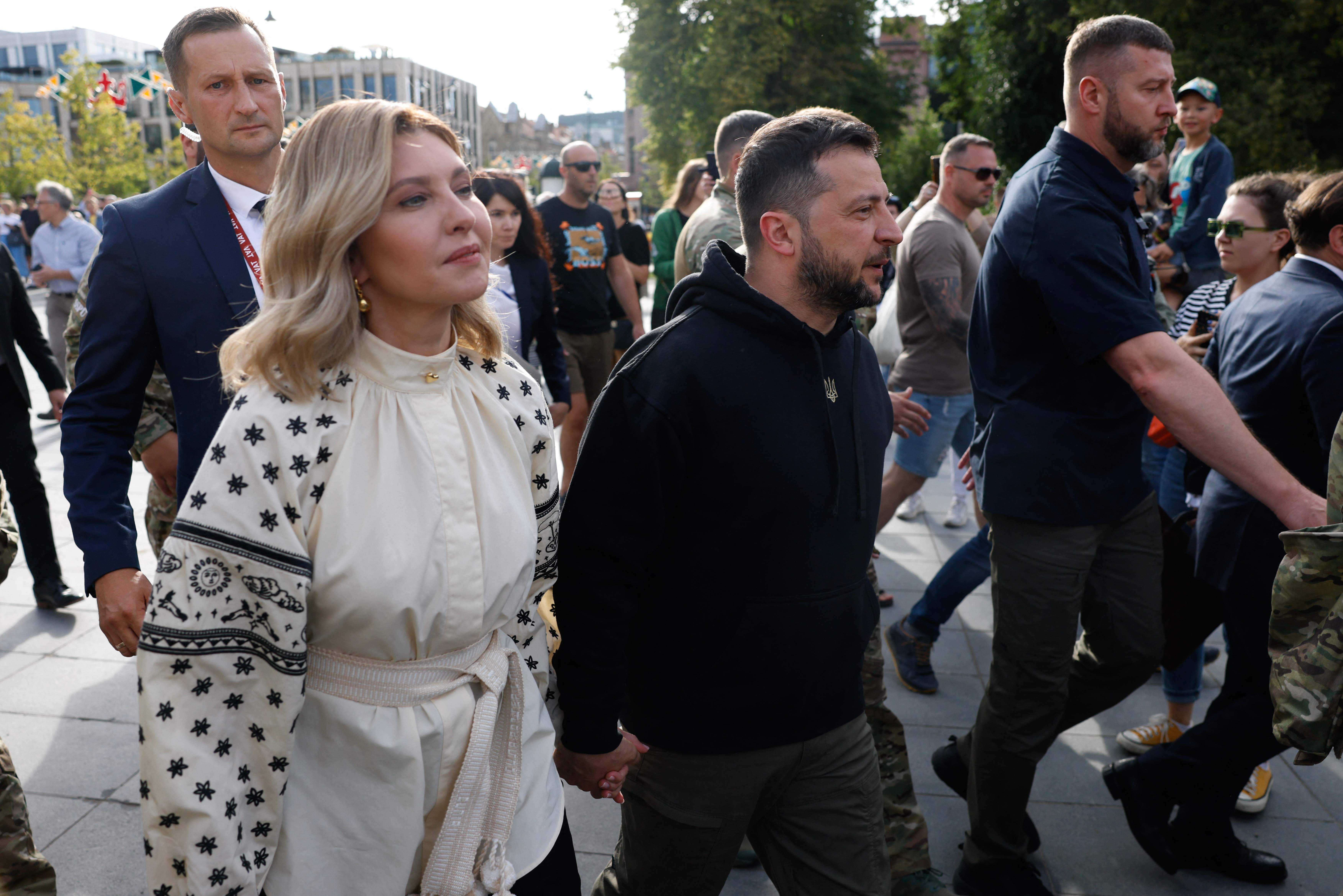
As we meet in Kyiv, Ukraine is careering towards another catastrophe of this bloody war: hunger.
In July, Russia turned its artillery turrets on Ukraine’s food and farming infrastructure after pulling out of a United Nations-brokered grain deal which allowed the safe exports of Ukraine’s grains and oils via the Black Sea. Officials from the UN told me that at the start of this year, despite the war, the World Food Programme still purchased food from Ukraine to feed the most vulnerable in places like sub-Saharan Africa and the Middle East. And so it is unthinkable that Ukraine, the “breadbasket of the world”, may not be able to even feed its own population.
But grain storages, ports and farmlands are on fire right now. This is having global consequences. Wheat prices have already soared, even driving up our shopping lists in the comfort of Western Europe. The UN has warned of famine and destitution.
Mrs Zelenska reminds me this is only the latest in a series of humanitarian crises in Ukraine that ripple past its borders. In June the bombing of the Kakhovka Dam, which Kyiv blames on Moscow, unleashed the waters of one of Europe’s largest reservoirs over southern Ukraine – causing one of the worst ecological disasters on the continent in recent history.
“Today's stage is another stage,” she says grimly of the attacks on food. “Ukrainians understand that our enemy is capable of inventing of any challenges for us.”
She says Ukrainians have adapted and are now well prepared for any new horrors on the horizon.
“The most popular Telegram [instant messaging] channel in Ukraine is not an entertainment channel, it is one that publishes the fastest news about the whereabouts and consequences of shelling and what is happening in relation to the war.”
“The popularity of this Telegram channel speaks for what Ukrainians live by. We are no longer surprised by anything,” she adds echoing a popular refrain in the country.
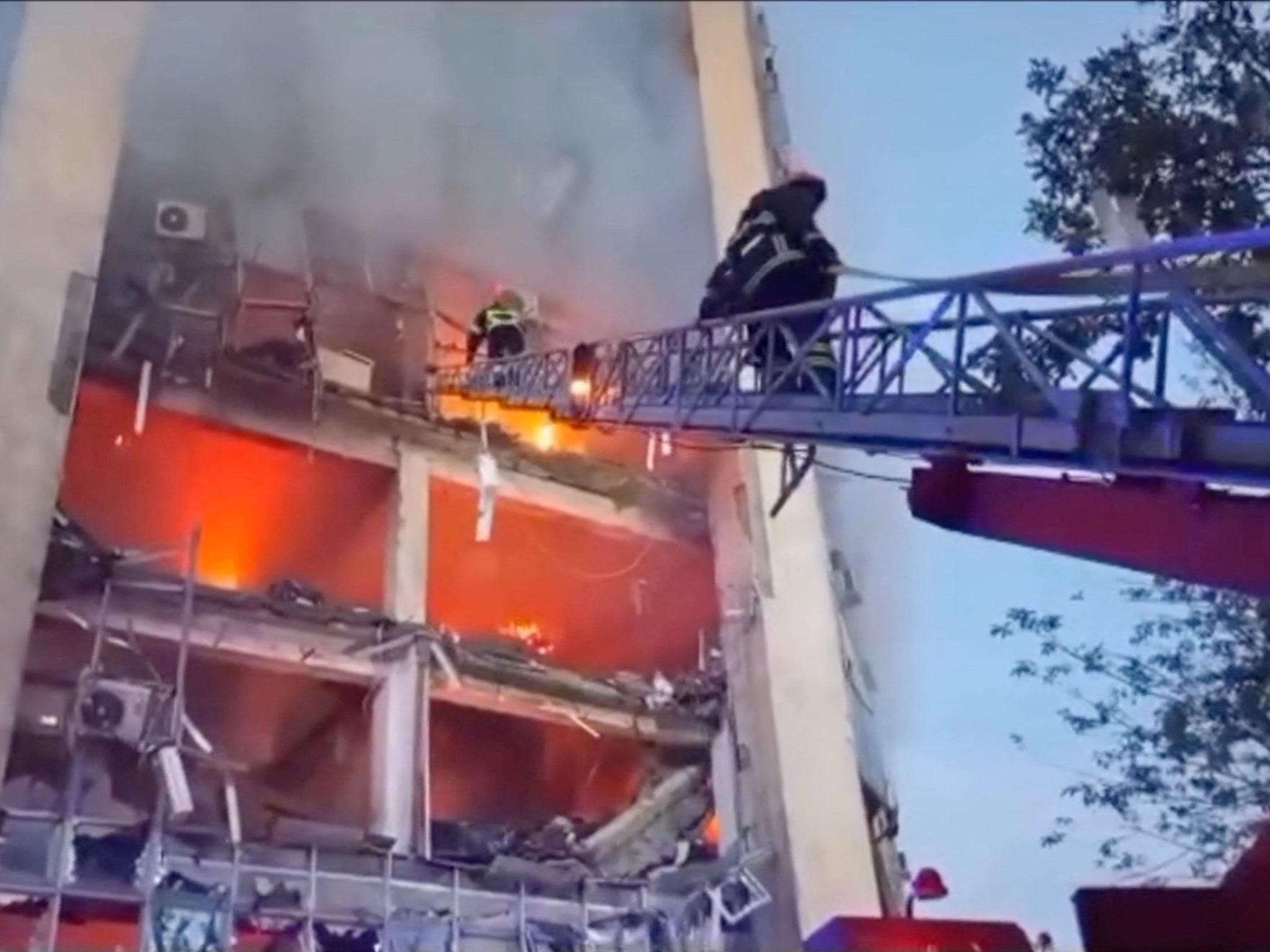
The cumulative consequences of these myriad crises in Ukraine are why the first lady says she decided to tap her contacts and create her own humanitarian aid organisation. The Olena Zelenska Foundation was eventually launched in September in New York with a star-studded guest list including US former secretary of state and first lady, Hillary Clinton, and Matt Damon. Among several projects, so far it has rebuilt hospitals in recently de-occupied areas like Izyum near the border with Russia and delivered tens of thousands of laptops to children, as a third of all schools in Ukraine are closed.
“It seemed to me that just talking on international platforms is not enough for the first lady,” she continues, her eyes lighting up. “I realised that I could put together this puzzle, unite those who want to help and those who need help.”
This is part of her wider mission to redefine what it means for everyone married to a president. She wants the spouses of world leaders to stop waving prettily on the sidelines and work together to build their own community to do good.
“We can no longer perform only a decorative function. We cannot just stand nicely next to the head of state. First ladies and gentlemen can try harder and do much more.”
“I hope this is the case, that we have set a new trend.”
And so despite being at war, this September she will host a third “Summit of First Ladies and Gentlemen” in Kyiv where she will gather “her colleagues” in person and virtually. This session will focus on mental health, a topic which is already “very painful for Ukraine” and the world, she says.
Ukraine is, in many ways, quite traditional. And since Moscow’s forces marched across the borders on 24 February, there has been societal pressure for everyone to have a stiff upper lip. There is a ‘Dulce et decorum est pro patria mori’ attitude, even if that means dying on the inside for your country.
This war is brutal. It is bloody. It is frightening. Artillery – indiscriminate and terrible – is relentless. Drones hit so fast that you cannot hear them coming. Banned weaponry like cluster munitions, in a single rocket, can shower their terror on territory the size of a football pitch. Everyone lives in a world of averages and percentages of survival, a ruse to feel better that is obliterated by the deadly whistle of a single shell.
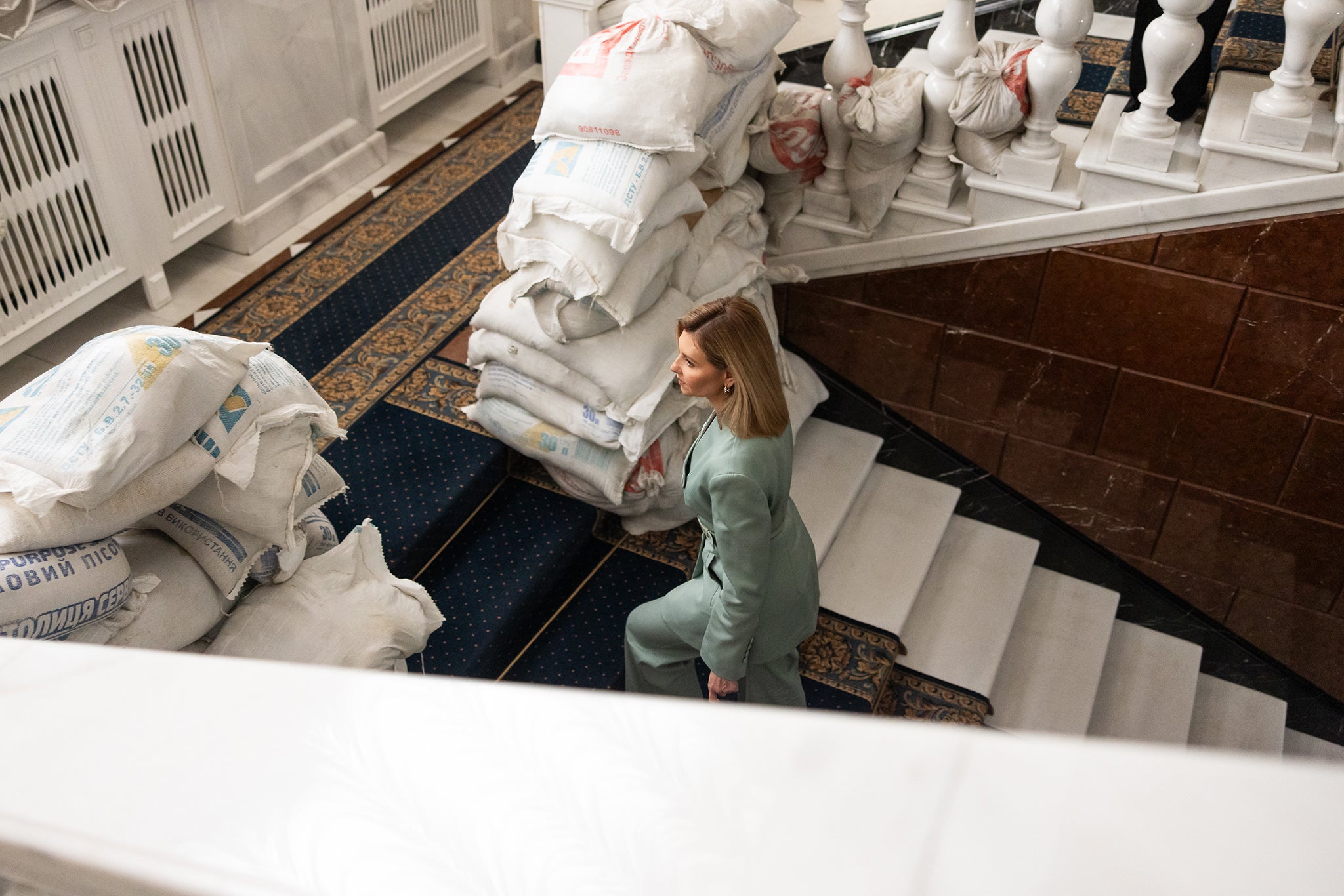
An unknown number of people have been killed, there is no accurate casualty count. There could be significantly more than 100,000 missing people, one Ukrainian top prosecutor told me in February. We have also documented horrific testimonies of torture and rape at the hands of Russian soldiers adding to this wartime mental health epidemic (Russia denies all the accusations of committing crimes).
Mrs Zelenska says Ukraine’s General Prosecutor’s Office is currently investigating a little more than 100 cases of sexual violence against men and women, but the true number of cases is hundreds of times that.
“The main problem is that people are afraid to speak about this, afraid of judgement, afraid of gossip. They are afraid that their life will be destroyed,”’ she adds, describing a new programme called “How Are You?” which assists people in opening up and getting psychological support.
“This is the most stigmatised crime of all the war crimes. It is terrible because victims pay with their whole lives. Some of them say that ‘it would be easier if they killed me, because what happened to me kills me every day and never ends’.
“It destroys families.”
Children are not spared this torment, she continues, her most emotional point in the interview. “Robbed of their childhood” she explains, many have “lost the will to live”.
“It is the most tragic thing to see when a child cannot smile, does not speak, or stops eating, these are terrible things we have to deal with now.”
According to Ukraine, at least 19,500 children have been forcibly transferred to Russia, a number Mrs Zelenska tells me is a woefully low estimate – as authorities have documented “whole orphanages have been cleared out”. Russia denies it has been abducting Ukrainian children but President Putin himself has been handed an arrest warrant by the International Criminal Court for the alleged crime. This, the first lady says, sends a powerful “symbolic” message that the world “sees this crime… and considers [President Putin] to be a criminal.”
“We hope it will have practical implications. Because they take away children who were separated from their parents during filtration, they clear out whole institutions. They simply put all the children on buses and take them to an unknown destination.”
So far, Ukraine has only managed to retrieve 380 of the missing children, but Mrs Zelenska indicates there is a new coalition of international partners that will start work on retrieving the rest soon.
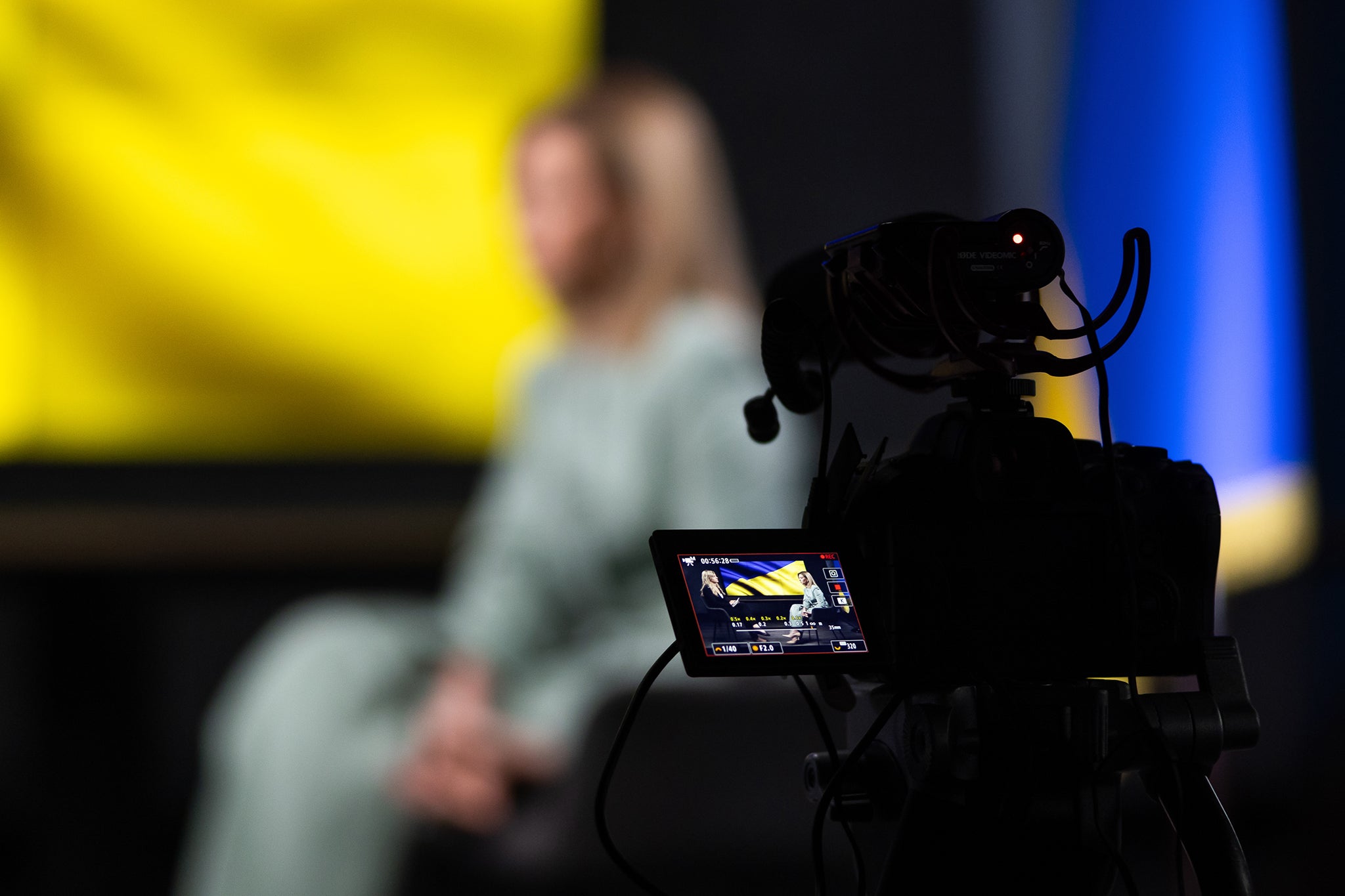
There are rare happy stories from these tragedies which the first lady says keeps her going and motivated. She talks about meeting a girl from the eastern Donetsk region who was taken to Russia after her mother, who had a military background, was captured by Russian soldiers at a “filtration” point. The grandmother worked day and night to find her, eventually enlisting the help of Ukraine’s top prosecutors. In the end the girl was located, the mother was exchanged in a prisoner swap and by some miracle they were all reunited.
“Just imagine the tragedy of this family, which was scattered by this war, not knowing where they all are for such a long time. It is difficult to fathom how you can keep going and not break down,” she says.
The Zelensky family has also been scattered by this war. And reading her face, it seems she is thinking in part about her own children as she speaks about this. For the first month and a half of the war, her husband – her college sweetheart turned number one target of the entire Russian army – could not see his family at all over concern for the safety of the children. They still live separately now but can at least sporadically visit each other in the building where we conduct the interview.
It is easier for her eldest, Oleksandra, now 19, who is old enough to come to the presidential office on her own and see her father as she needs, Mrs Zelenska explains. Kyrylo, still only 10, “needs a father not just once or twice a week,” she says.
“To raise children, you need a constant example,” not just “video calls”, she continues.
“These are not only conversations and stories about how you should act. These are immediate examples of how you behave in everyday situations, and how you solve particular problems. And, unfortunately, our children don't get much of this help now.
This “confuses” her, she says, repeating that phrase a few times. “I am sure that we will pass this test,” she adds, leaning forward.
“We all love each other and trust each other. We really hope that somehow all this will change, and we will be able to live a more or less normal family life.”
For a second, the personal motivations for wanting the war to end peep through her near-perfect stateswoman demeanour. For an instant, there is a glimpse of an exhausted parent just wanting her family back together again. And then she clicks back to speaking about the rest of Ukraine.
For all families in the country this depends on winning the war, which in turn depends on the international community, she continues. Ukraine has “no other way out” than enduring.
“It is a matter of survival. That's why it's so hard because it's been going on for so long. That is why we need news that gives us hope.”
And they need help to do that. The first lady is worried that some countries have started to underestimate the threat of Russia because it seems “so far away” and if Moscow wins, it will impact the world order.
“Ukrainians are paying for this with the lives of their compatriots, the rest of the world just pays with its resources,” she says in a direct appeal to the international community before we bring the interview to a close. She has a string of meetings to get to about the prosthetics centre she has helped build.
“Please don’t get fatigued, because we as Ukrainians have no right to get tired.”
“Ukraine defends not only its interests, not only its existence, we are trying to maintain the entire democratic balance of the world.”
With additional reporting by Nikol Goldman
The full interview will be available to watch on independent.tv and your smart TV from August 7.
To find out more about our Independent TV smart TV app click here.



Join our commenting forum
Join thought-provoking conversations, follow other Independent readers and see their replies
Comments